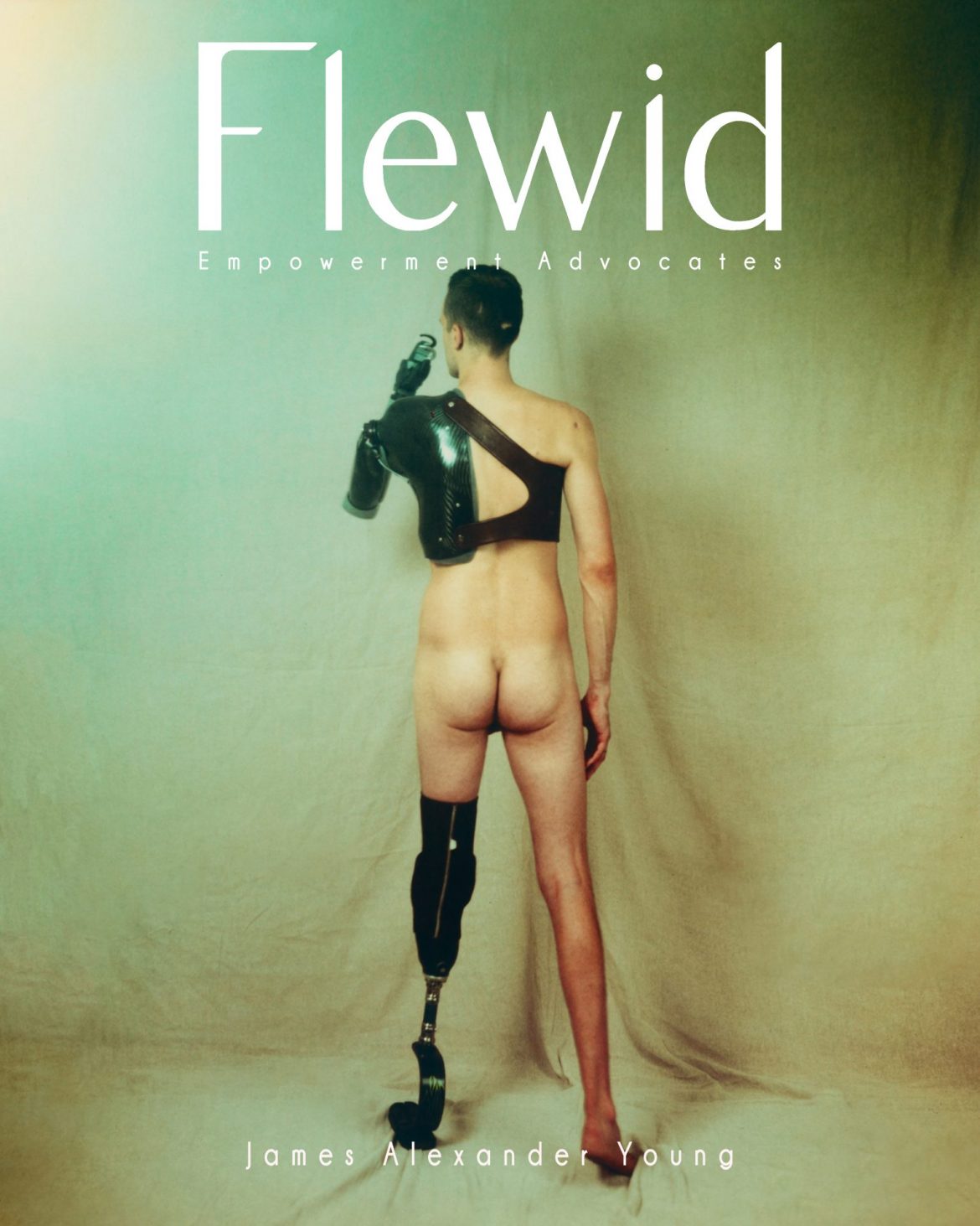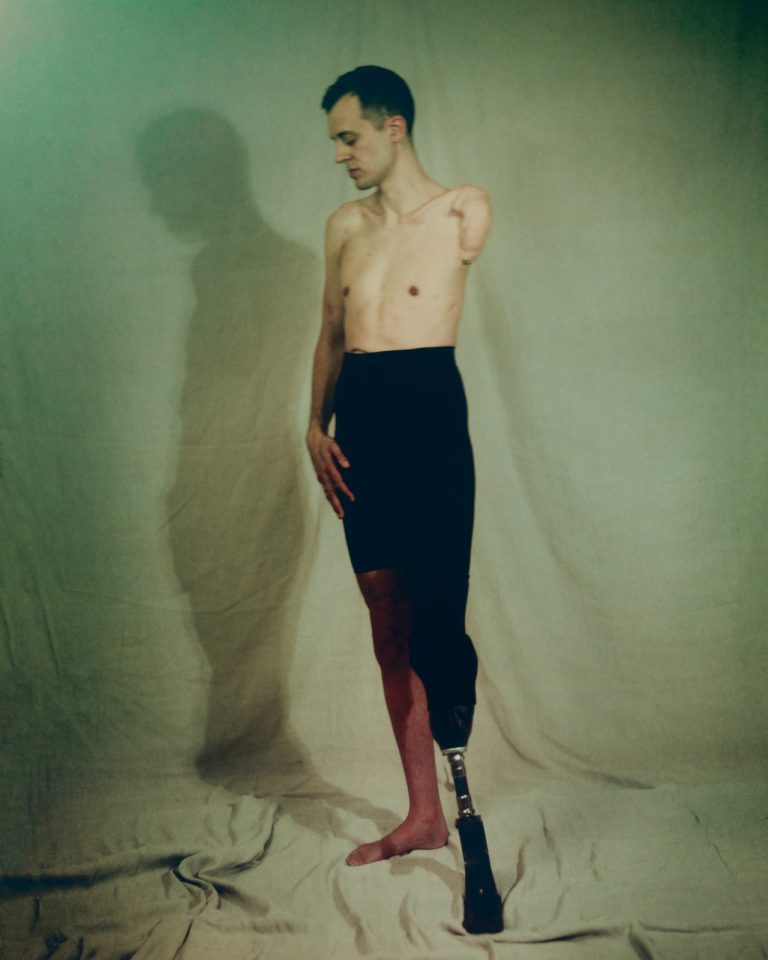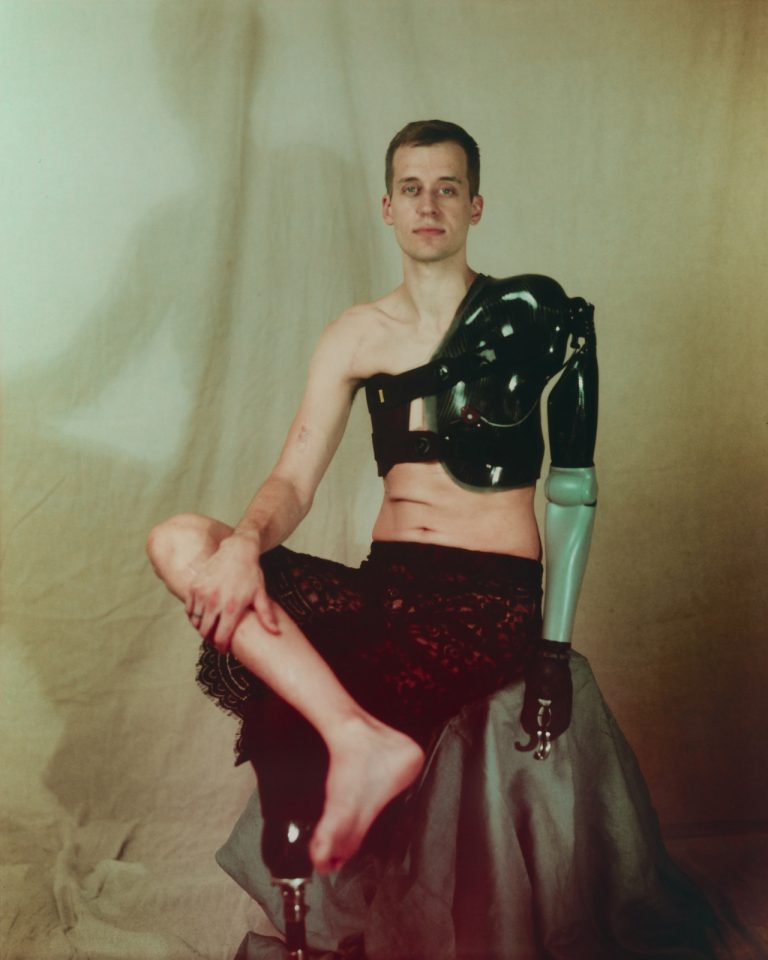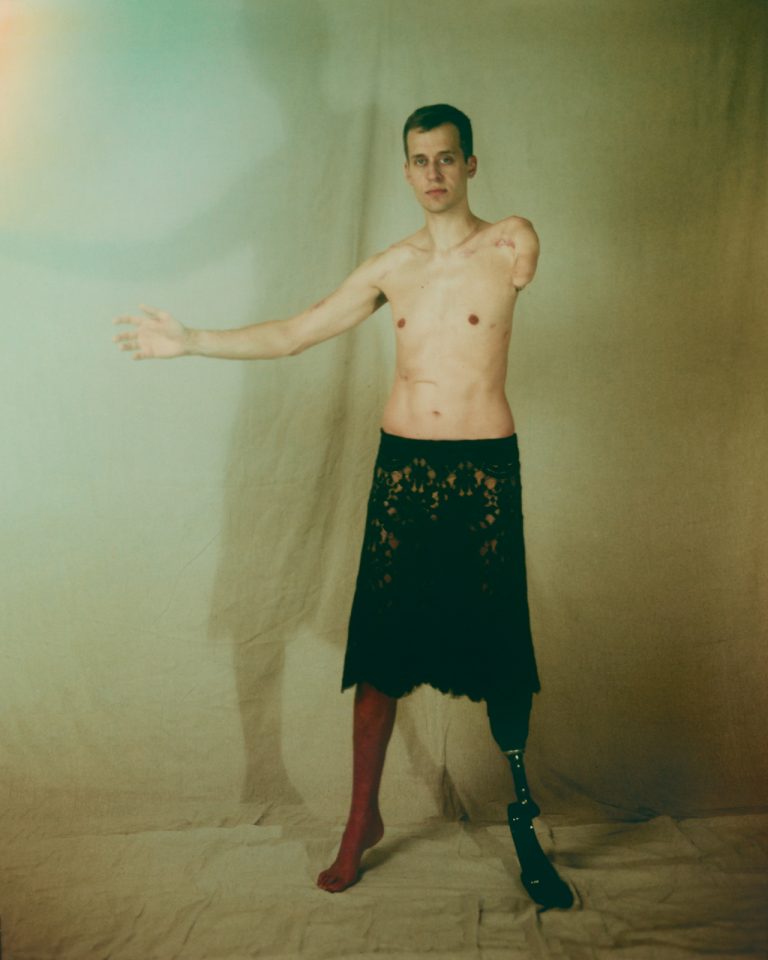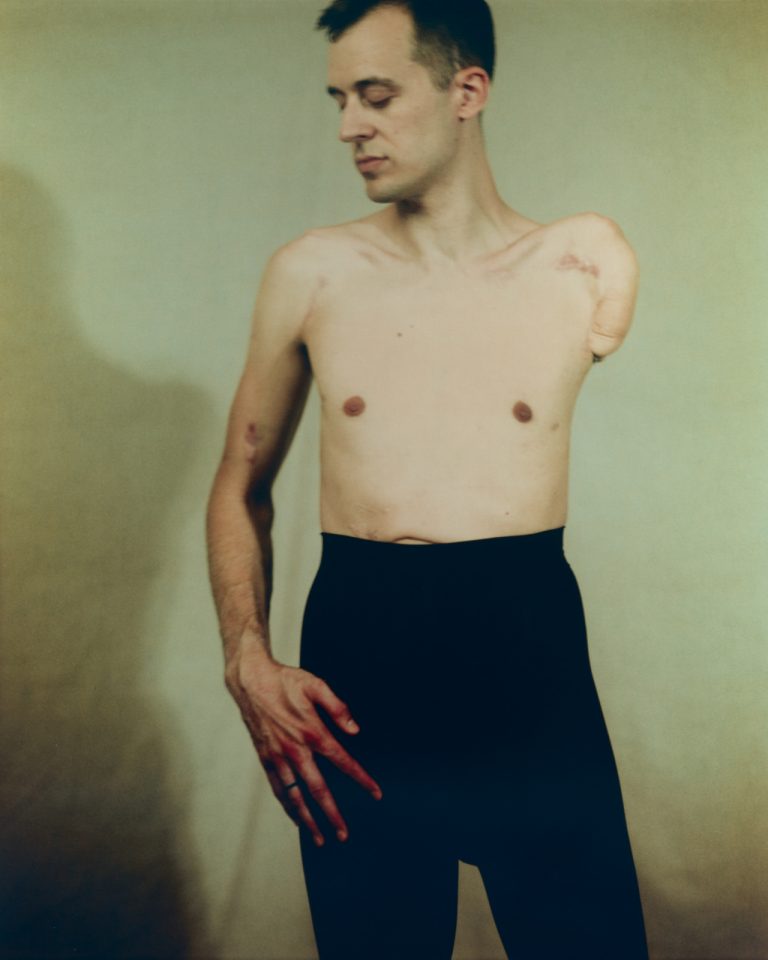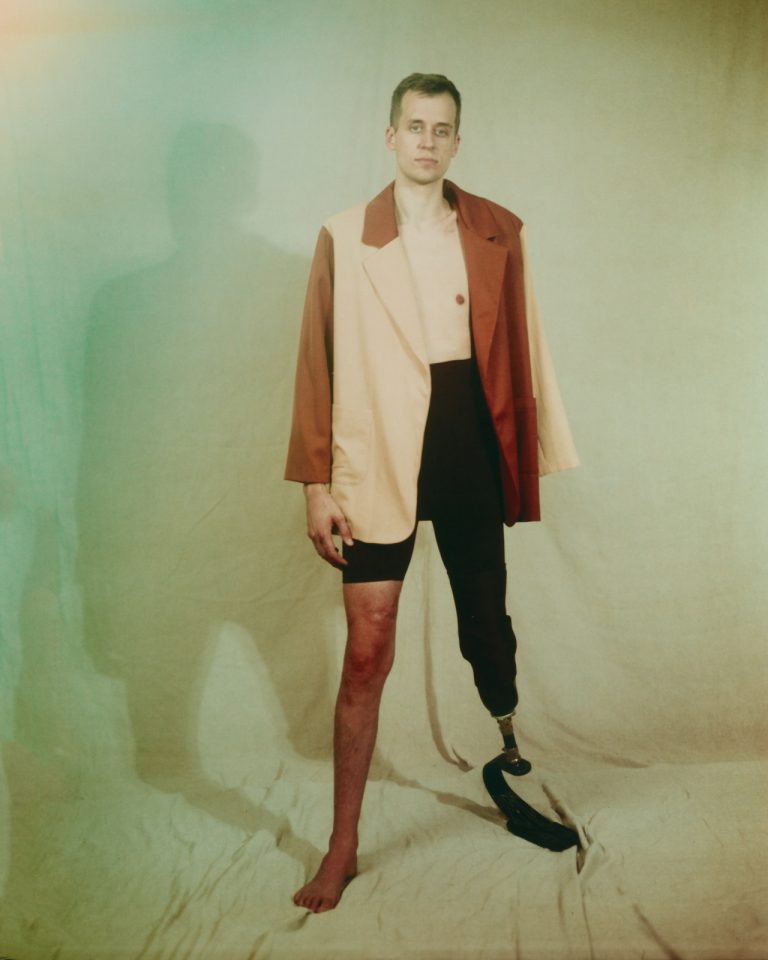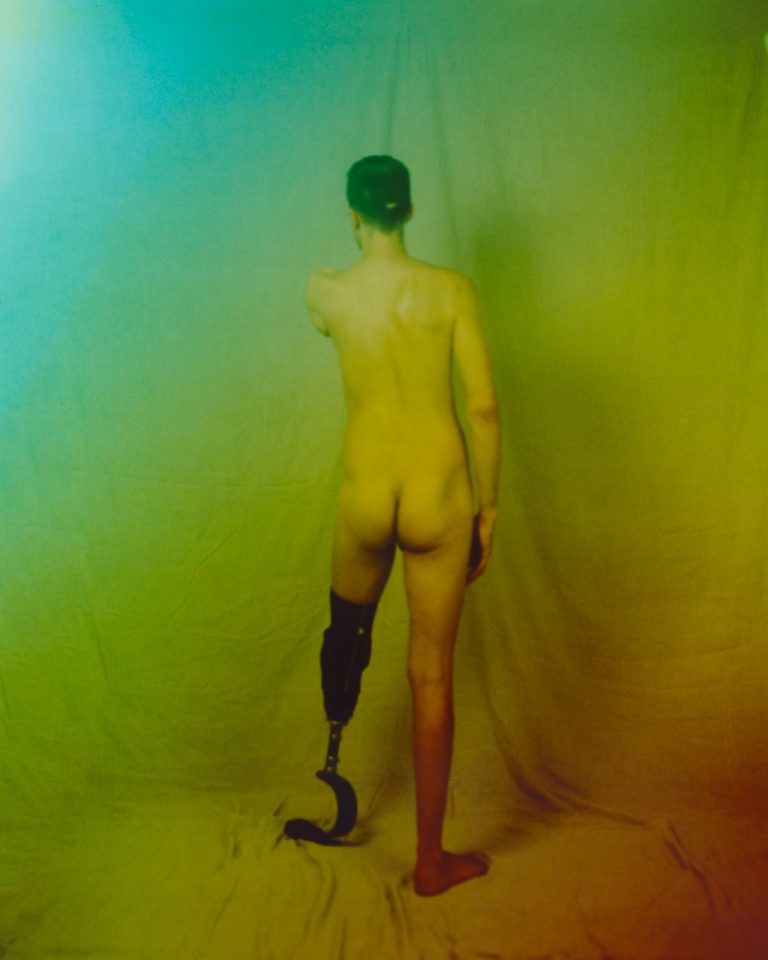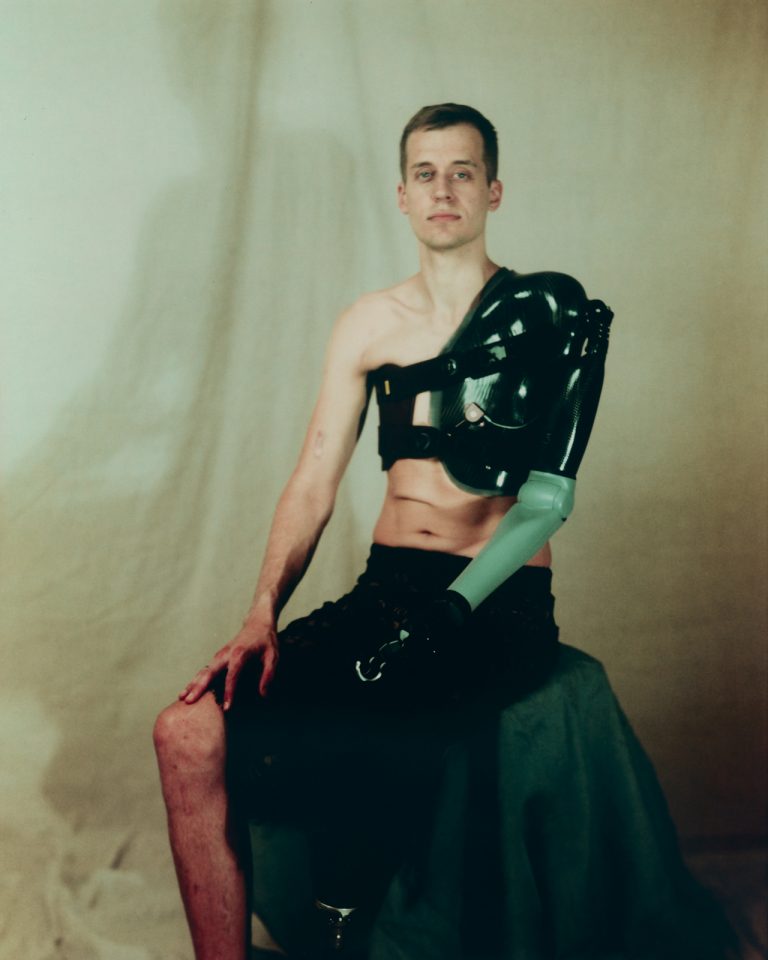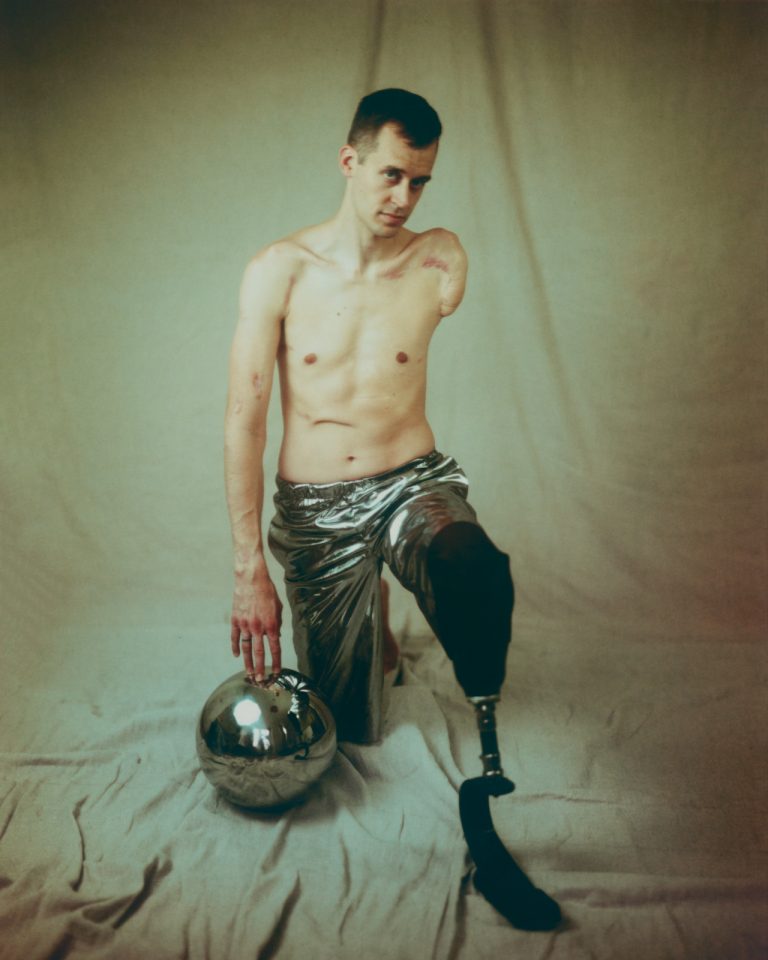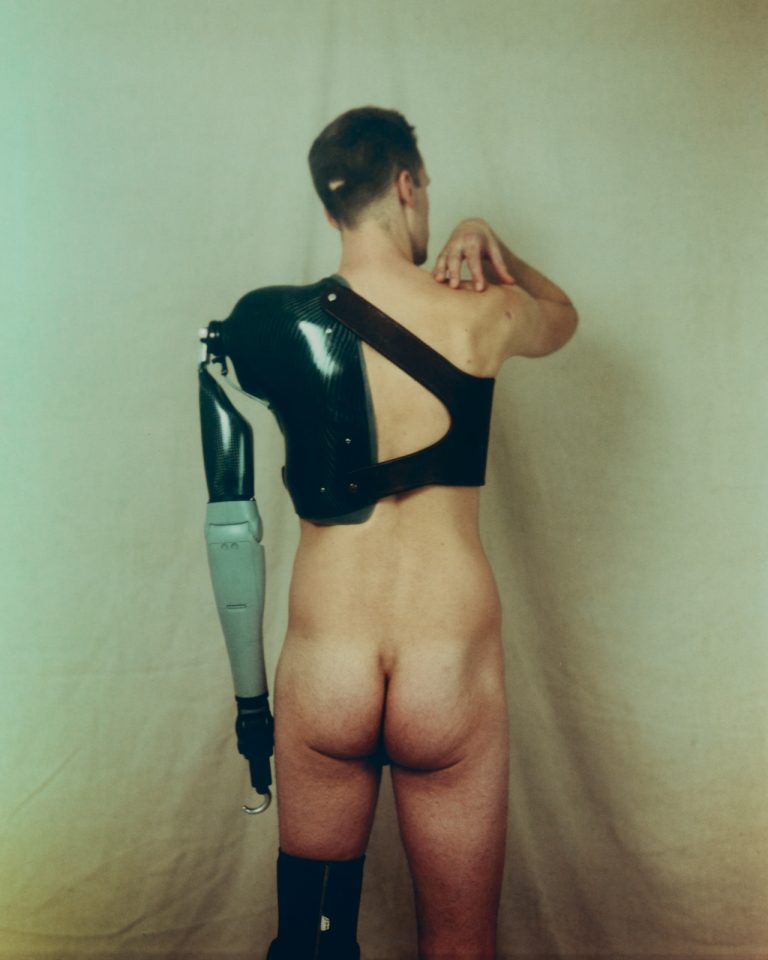Photography Ralph Whitehead
Styling and grooming Giulio Cascini
All Clothing Poet-lab
James @ZebedeeTalent
DIGITAL COVER STORY
James Alexander Young wears total look Poet-lab
Interview Johanna Urbančik
If you live in the UK and watched TV, you’re surely familiar with James Young’s documentary films. Having released his latest film on Sex Robots four years ago with the BBC, he’s now moved on to modelling, as well as being a motivational speaker. Having lost his arm in an accident several years ago, James has now become active in the world of robotics and bionics. Flewid caught up with James to talk about the progression of prosthetics and the hierarchy of diversity when it comes to disabled people.
Are you still like keeping up with the topics you researched and dealt with in the films?
Sex robots? No. It gets into my field, which is a bit technological and sciencey. So, I guess in my circles, I do. I hear about what’s going on with people’s projects and ethics projects. So in a way, yeah. But taking the Sex Robots film as an example, I explained that it’s not necessarily going to be a thing. The people that do it, will just be the ones that want to do it. And it doesn’t have to affect the rest of us, necessarily. I imagine it will be socially self-regulating for the foreseeable future, if it were to break the world I’m sure we will figure something out.
Flewid: How much would you say prosthetics and bionics have progressed in the last couple of years?
I think the progress, in terms of hardware, is similar. The costs of developing products and prototyping are cheaper. We have access to the same levels of advancement, but cheaper. There’s a competitive challenge to established robotics companies and established brands.
You can start building at home, and stuff of relatively good quality, and that’s cool because it means we’re seeing challenges to the price of things like bionic hands, productsthat have previously cost enormous amounts ofmoney. Now, you can work on that with 3D printed parts and access factories quickly online instead of traveling. Onmarketplaces like Alibaba, for example, you can negotiate to get your parts made for single 1000s [of Dollars/ Pounds] to create your ideas.
That encourages disruption of stale companieswith big budgets and established technological resources to be prompted to develop new technologies that challenge what the standard product is level. It’s a cycle of increasing affordability to disrupt and muscling the big guys into investing to make something that’s next level.
How tech-savvy do you have to be to get parts of a prosthetic arm made from Alibaba, for example? If I was in that position, I’d have no idea what I’d be looking at, or what I’d have to look for.
Well, when I said Alibaba, I meant you’ll be able to access somefactories without prior connections. Previously, you’d have to go to China, visit factories or find who knew who like talking toventure capitalists that funded similar products, networking to find who managed the relationships. But now, you can go online and say this is the design of this part that I need to be made. Can you make me some? And they’ll say, Oh, we can do 10,000 for this much money, to this standard, and we are accountable for that. It’s competitive because it’s an online marketplace and everyone can be connected. You’re not necessarily buying bits of an existinghand, but you can repurpose existing components and design to them. You can use platforms like Alibaba to source commercial partners to build your design. So, you have to be tech-savvy, because you have to be an engineer a very curious person with access to lots of time and knowledge, even YouTube, to be able to come up with the things you need. There are projects today to fully document how to build your own full scale robots. It’s a lot of work and time. But, the fact that it exists means that it’s possible to do it as a hobbyist, as well. Making something to sell as a commercial product (and especially as a ‘medical device’), however, is extremely limiting and comes with stagnating approval processes, and unfortunately bionic hands are subject to similar rules as things you implant into your heart.
What does the community look like for people that are really into robotics? Is it like very tight-knit? It is big?
I guess, in a way, there are two versions. There’s one where you’ll go to a hackspace or something in the real world, and be able to meet friends, hang out and use the equipment. A hackspace provides the equipment, so you don’t have to have all the stuff at your house. That’s a local community-way to do it. But in terms of where I am currently, it’s just online, and the community around is vast and varies. And obviously, I think there’s a relationship between the culture of science fiction and video games. People like to do cosplay, and they’ll develop the skills to be able to print stuff like that, but find that they are now also engineering pieces of equipment in a way. But forme. I am excited by the practical stuff, I guess. It’s so nice and friendly and helpful that you can just go online, find some files or a design and can ask the people on the other side if canthey point me in the direction of right bits. It’s just completely friendly. There’s no hate at all. The only thing people get is maybe a bit tired of answering some of the same questions, but they’ll still point you in the right direction. I think hobbyists can get incredibly accomplished, sometimes more than people working in industry, because they get to keep their passion. Due to the limits of an online behind-the-keyboard ‘hobby-verse’ I think that going out of their way to help others can feel socially validating, maybe it’s a way to get their expertise recognised. Whatever the reason, it’s a cute and great community.
That sounds incredibly friendly for the Internet, and almost not believable. That brings me to another question. I went through your Instagram. I saw one of your posts where you were talking about your friends receiving horrible comments from mainly male users on their disabilities. Did those kinds of comments get better, or are they getting worse? Because in every other corner of the internet, they seem to be getting worse. I wouldn’t want to hazard a guess on if it is worse or better because I don’t often get a lot because I’m male. My wife (who is also an amputee)is certainly under that kind of pressure. But you’d have to talk to her to understand if there’s a change in the trend or anything like that.
That’s also quite interesting that you don’t get a lot because, again, it’s still the internet. That’s at least again, another positive thing. I’ve also seen on your website, that you were collaborating with the Japanese computer game company Konami. Can you tell me a little about that?
That was what kicked off being more inpublic, in a way. After I had my accident, I was frustrated with the limited prosthetics that I could afford to access in the UK. So I always had my eye out. Then I stumbled across this competition, which was about designing your ownarm. It was ran by The Alternative Limb Project who had a personal relationship with Konami. And Konami, they’d figured this a way that was just nice for everyone to promote the video game Metal Gear Solid V. I matched up with them and got on really well with them, so we went ahead and did it. It was supposed to be an exploration of alternative functions in a science fiction way for an arm, which is why it had the drone, the lights, and lasers. It ended up including a prototype hand on the end created by Open Bionics. They have since received millions of dollars of funding and awards. This helpedmake massive progress and refinements to their designsto create usable, affordable, bionic hands for kids, small adults. It was really fun working with them, seeing their products mature. They basically started up the 3D printing around electronic prosthetics. We used so much 3D printing for my arm, it had 3D printed parts, by filament, laser sintered,, and moulds for advanced carbon fibre used in F1 race car bodies
One of the things you mentioned at the beginning was that you’re unhappy with the prosthetic hand that you were given, or that you were provided, by the NHS. Has that progressed since?
I didn’t have a prosthetic hand from the NHS. They wanted me to do body power control, which is a terminal device that was just powered by pulleys. It sucked because I don’t have much length to my arm, so, to have the leverage to operate that and to get any meaningful strength from a device like that is hard for someone in my amputation height.I am bony, as well, so itwas annoying to try to push force on my collarbones in orderto open the hand. It wasn’t comfortable with that mechanism , and so I didn’t use it. It took the 3D printed prototype of the Alternative Limb Project arm for meto realize that controlling this with EMG electrodes to open and close it was game-changing. It’s a tiny amount of muscle exertion I have to do to get a full grasp and a full open by the hand, electrically . That clued me in to it in a way,a lightbulb moment for electric power. Also, meeting people like Angel Giuffriathat use bionics pushed me to try for an electronic arm from the NHS, and I’m thankful for that This whole time it’s been a struggle to get a fit because there are not a lot of people like me at this kind of amputation, weirdly enough. They just don’t have the expertise and training to get it right. It’s been years I’ve been trying to do it with them. It’s only now I’ve got one that works just about. It’s not comfy, but I can use it for some tasks. I use it because it’s useful. And that’s with the NHS. That was just a single grip, electric thing with the NHS. They still only do single grip for the time being – that’s one grip, no multiple articulation of fingers. We might have a decision soon that the NHS might fund multi-articulating myoelectrics, like a Covvi Nexus hand for example. I’m one of the ambassadors for that hand company at the moment. We’re almost potentially looking at a decision for multi-articulating hands for the upper limb, which is crazy. If they invested in myoelectric like that, we would save thousands of pounds or dollarsof socket-building time, clinician time, and trying to build body-powered things that couldn’t have ever been viable. They didn’t have the right path to put me into the appropriate prosthetics. I’m glad that, potentially, this is going to come through soon.
Hopefully. Let’s hope there won’t be any more spending cuts in the NHS and this will go through. I want to touch on something else. There’s such a big conversation on diversity at the moment. I feel that people with disabilities are always left out of that. Do you feel the same, or how do you see it?
I feel like I’m in a weird situation. Because I agree with you. People with disabilities are, statistically, the most marginalized in terms of representation. But in terms of what I was saying, I feel I’m in a weird position as an amputee because I feel we’re being marketed as “the” disabled diversity. I don’t know if you would agree with that fromwhat you’ve seen, but I certainly see limb different people around in marketing I don’t know, maybe it’s less offensive, for whatever reason, to the general public to see a cute kid with a congenital limb difference, rather than other disabilities Generally, in stores, you’ll see a cute limb different kid on the posters. I was in rural Florida this summer, and the only poster they had in the clothing section of Walmart was of a congenital amputee kid, which was so cool but kinda strange. I feel we’ve got the “easy” disability, almost. You’ll maybe get people sat in wheelchairs and then perhaps people with congenital limb differences – but where is literally everyone else?!
We’re in a weird position because I don’t want to be “the disabled diversity”. I don’t think that’s fair. I think we need to see diversity in.… The diversity. We’re only seeing one part of a population. It’s slowly increasing,but it’s not increasing the correct way.
That’s right. I feel in the wider entertainment industry, though, there’s a lack of diversity at large.
That’s very true.
I’m curious. Are you thinking of going back into filmmaking, or are you working on something at the moment?
I wasn’t the biggest fan of the process of TV. It’s quite stressful to continually pitch and adjust. Especially not being inside the BBC myself. I was responsive and tried to give them things when they changed ideas. When we finished making those films, I spent months and months in America. I went off their radar, to be fair. It’s a shame, but I don’t think super miss it. I don’t miss that you have to target a narrative, one that’s agreed upon, though if you didn’t it would be hard practically to plan a film. I’m not the biggest fan of that kind of storytelling. My main challenge is that I’m too interested in everything and anything to direct my energy towards something in particular.

